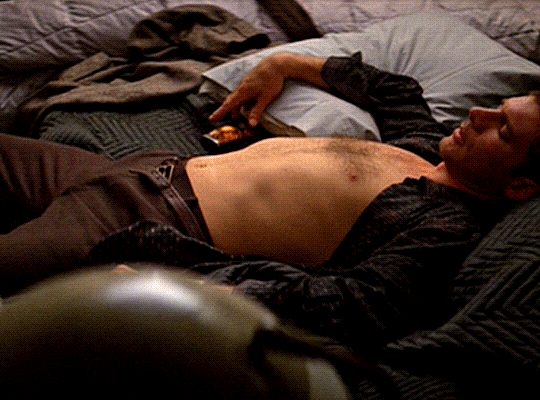Which of the 16 desires motivates Forrest Gump? The first thing that comes to mind is he likes running, chocolate, and ice cream. Does that fit into the 16 desires? I think it might!
Forrest starts life with a back as ‘crooked as a politician’ and sports leg braces through elementary school. He’s ridiculed for being mentally slow, but Forrest can outrun bullies on their bikes when he kicks off his shackles.
“Now, you wouldn’t believe me if I told you. But I can run like the wind blows. From that day on, if I was going somewhere, I was running!”
The bullies chase Forrest throughout high school, switching out bikes for trucks, but by the time Forrest is nearing graduation, he is a world-class runner. This is his ticket to college football with a full-ride scholarship. He even becomes an All-American and eventually a world-class ping pong player. But we are looking at ability. Forrest is a gifted athlete. Maybe even superhuman. But people may like sports for the friends they make or the competition, but Forrest likes physical activity for its own sake.
“I ran clear across Alabama. For no particular reason, I just kept on going. I ran clear to the ocean. And when I got there, I figured, since I’d gone this far, I might as well turn around just keep on going.”
Reporters ask him, “Sir, why are you running?” They ask if he is doing it for world peace, women’s rights, the environment, animals, or nuclear arms.
But that wasn’t Forrest’s motivation. “They just couldn’t believe that somebody would do all that running for no particular reason.” But his answer was, “I just felt like running.”
So, what else motivates Forrest Gump? Maybe the next clue is in another of the film’s famous lines, “Life is like a box of chocolate.” Does food motivate Forrest? He remembers meeting the president, but the real treat of that trip was all the free Dr. Pepper! Forrest offers Lieutenant Dan ice cream. And he and Bubba bond over shrimp! Forrest even starts the shrimping company in Bubba’s name. He is also excited to invest in the fruit company Apple.
So, eating might be on his list. What else? We can look at Forrest’s dedication to Bubba after his death. Is Forrest honorable? He respects his mother but doesn’t understand or follow local traditions. He’s not interested in social hierarchy, power, or vengeance. In fact, the only times Forrest gets violent is when defending his friends. He beats up several of Jenny’s abusive boyfriends and carries his whole unit to safety in Vietnam. What about social contact? Is Forrest motivated by his friends? I think he is.
He may not be smart, and he may misunderstand situations, but Forrest loves being with his friends. Throughout the movie, he has three close friends: Jenny, Bubba, and Lieutenant Dan. He meets Jenny and Bubba on a bus. When everyone else rejects him, saying, “Seat’s taken,” Jenny and Bubba invite him to share their seat, saying, “You can sit here if you want to.” Forrest is constantly rejected and bullied, but does he want to be accepted? I don’t think that is his motivation. Instead, he wants companionship.
Forrest and his friends protect one another. Jenny tells Forrest to run away from danger, and Forrest attacks her abusive boyfriends. Forrest saves Bubba and Lieutenant Dan, and Lieutenant Dan kicks the drunk girls out of his New Year’s party for calling Forrest Stupid.
So here is my guess for Forrest Gump’s motivations:
- Physical Activity (Exercise, Active, Moving)
- Social Contact (Friendship, Companions, Group play)
- Eating (Food, thinking about food and planning meals)
And while we are here, let’s guess what motivates Forrest’s best friends.
I think Jenny is motivated primarily by acceptance because she always wants to fit into social trends, whether playing guitar or doing drugs. I think she values her own independence because she is fiercely self-reliant. That behavior may come from her abusive childhood, but she has a chance to stay with Forrest when he gets her pregnant, and she chooses to leave and live on her own, leaving him and his gazillion dollars behind. I think where Forrest wants a friend, Jenny wants someone who will accept her. Romance may be another of her motivations. She’s entranced by art and appearance, always fitting in with the times. She could also be an idealist, but I think most of that is a cover to be accepted by the cool crowd of her day.
So here are my guesses for Jenny’s motivations:
- Acceptance (Attention, Approval, Inclusion)
- Independence (Freedom, Self Reliance, Determination)
- Romance (Beauty, Art, Attraction)
For Bubba, Eating is his primary motivation. He can talk for days about food. We don’t see as much of Bubba in the film, but my second guess would be social contact. He is happy to have Forrest as a friend. As for a third motivation, I am not sure. Maybe even the second motivation is weak since we don’t get to know Bubba that well.
So my guesses for Bubba’s motivations are:
- Eating (Food, thinking about food, and planning meals)
- Social Contact (Friendship, Companions, Group play)
Lieutenant Dan’s primary motivation is Honor. Forrest tells us that Dan “was from a long, great military tradition. Somebody in his family fought and died in every single American war.” And Dan had every intention of honoring that tradition. If not for Forrest, Lt. Dan would have died in the field, which is exactly what he wanted. But Forrest saved him. One night, in the hospital in Vietnam, Dan pulls Forrest to the ground and accuses him of dishonoring him.
“You cheated me. I had a destiny. I was supposed to die in the field! With honor!
That was my destiny! And you cheated me out of it! You understand what I’m saying, Gump? This wasn’t supposed to happen. Not to me. I had a destiny. I was Lieutenant Dan Tyler.”
Dan sarcastically promises Forrest that he will be his first mate if he starts a shrimping company. And Dan honors that promise. Even his protecting Forrest might be because he owes Forrest his life. My guess for his second motivation is Vengeance, which mostly comes from the Hurricane Andrew scene when he curses at the sky. This one isn’t as strong as his motivation for Honor. Now that I think about it, Honor still covers Dan here. Dan feels dishonored and wants to die, just like he did in the field.
So I take it back. I think Lt. Dan is motivated by the following:
- Honor (Integrity, Loyalty, Trust, Tradition)
Dan’s motivation for honor is so all-encompassing it makes him a force of nature. Losing his legs is such a deep blow that it might give him enough dimension without secondary motivations. We don’t get to know Dan on a personal level until after Forrest saves him. Dan has lost the honor he wanted and has to come to peace with himself, Forrest, and God.
The characters in Forrest’s have significant flaws. Jenny was abused. Lt. Dan lost his unit and his legs. Bubba wasn’t much smarter than Forrest. And Forrest knows he is not a smart man. Forrest hates being called stupid and cries in relief when he finds out his son is one of the “smartest in his class.” Forrest’s lack of intelligence is a weakness but does not determine his motivations or personality. Forrest wants physical activity, friends, and food. And I think examining his friends rounds out Forrest’s world.
Interestingly, while we know Forrest well and can carefully pick out his motivations, the secondary characters present more of a challenge. I’d be pushing too far by demanding that Bubba or Lt. Dan have three unique motivations. They do not seem to.
Maybe we’d get to know them better if we had more time with them in the film. But they are memorable characters who significantly impact Forrest and us. And the motivations they do have are so clear they are almost archetypal in their presence. Dan’s talk about Honor and Bubba’s talk about shrimp are legendary. So maybe if you have a side character who needs to leave a serious impact on the audience, pick one motivation and turn it up to eleven.



























